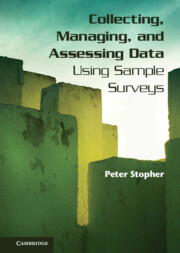Book contents
- Frontmatter
- Contents
- Figures
- Tables
- Acknowledgements
- 1 Introduction
- 2 Basic statistics and probability
- 3 Basic issues in surveys
- 4 Ethics of surveys of human populations
- 5 Designing a survey
- 6 Methods for conducting surveys of human populations
- 7 Focus groups
- 8 Design of survey instruments
- 9 Design of questions and question wording
- 10 Special issues for qualitative and preference surveys
- 11 Design of data collection procedures
- 12 Pilot surveys and pretests
- 13 Sample design and sampling
- 14 Repetitive surveys
- 15 Survey economics
- 16 Survey implementation
- 17 Web-based surveys
- 18 Coding and data entry
- 19 Data expansion and weighting
- 20 Nonresponse
- 21 Measuring data quality
- 22 Future directions in survey procedures
- 23 Documenting and archiving
- References
- Index
3 - Basic issues in surveys
Published online by Cambridge University Press: 05 June 2012
- Frontmatter
- Contents
- Figures
- Tables
- Acknowledgements
- 1 Introduction
- 2 Basic statistics and probability
- 3 Basic issues in surveys
- 4 Ethics of surveys of human populations
- 5 Designing a survey
- 6 Methods for conducting surveys of human populations
- 7 Focus groups
- 8 Design of survey instruments
- 9 Design of questions and question wording
- 10 Special issues for qualitative and preference surveys
- 11 Design of data collection procedures
- 12 Pilot surveys and pretests
- 13 Sample design and sampling
- 14 Repetitive surveys
- 15 Survey economics
- 16 Survey implementation
- 17 Web-based surveys
- 18 Coding and data entry
- 19 Data expansion and weighting
- 20 Nonresponse
- 21 Measuring data quality
- 22 Future directions in survey procedures
- 23 Documenting and archiving
- References
- Index
Summary
Need for survey methods
Much scientific enquiry needs data. Data are needed to permit scientists to test theories and hypotheses about phenomena around them, to estimate models that might be used to predict the behaviour of various phenomena, to calibrate or tune the models as new information becomes available or as the situation changes, to validate models, to describe situations, to develop ways of simulating the real world in laboratory or controlled conditions, and so forth. Some areas of science and engineering can develop data through undertaking laboratory experiments. In such cases, there is no need for a survey to collect the relevant data; rather, the data are collected from observations and measurements made during the laboratory experiments. However, in many instances in both science and engineering, as well as in most instances in the social sciences, laboratory experiments are either not possible or will not provide the information needed.
When laboratory experiments are not feasible or possible, observation of the real-world phenomenon of interest becomes necessary. There may be limited situations in which observation can be made of the universe of interest. However, in most cases, this is not possible, and it is necessary, instead, to measure some subset of the universe. In the same way that it is not usually possible to measure the universe, it is also often not possible to measure everything that may be relevant about the universe, or those members of the universe that are measured in a survey. For example, one might be interested in measuring the population of Sydney, Australia, and desire to measure everything relating to their purchasing patterns for groceries and other non-capital items. However, the population of Sydney is approximately 4 million people in about 1.3 million households. Measuring all those people would be much too expensive. Further, it may be desired to measure their buying behaviour for a period of the past twelve months, and also to obtain information on a wide variety of social and demographic descriptors of the households and people. However, to measure all the desired information is, again, likely to prove too burdensome for people to provide. Therefore, in two respects, it becomes necessary to reduce what is measured: one must measure a sample of the population, and one must measure only as much about that population as it can reasonably be expected that people will be willing to tell.
- Type
- Chapter
- Information
- Publisher: Cambridge University PressPrint publication year: 2012
- 2
- Cited by



